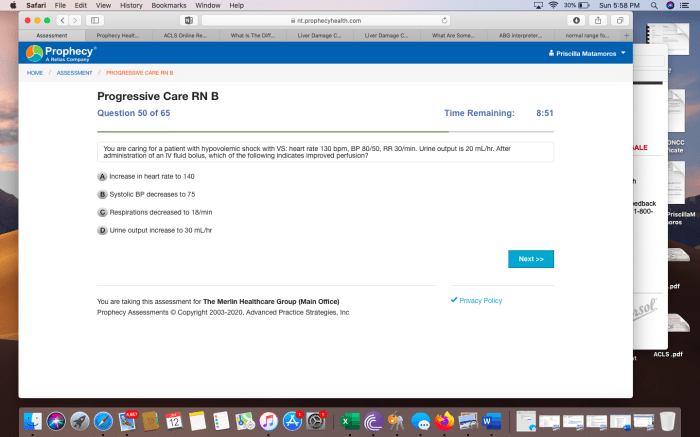Relias progressive care rn a – As the esteemed Relias Progressive Care RN takes center stage, this comprehensive guide invites you on an immersive journey into the world of progressive nursing. With an emphasis on delivering patient-centered care, this role offers a rewarding and fulfilling career path for those passionate about making a meaningful difference in the lives of others.
Throughout this guide, we will delve into the essential skills, qualifications, career opportunities, and responsibilities of a Relias Progressive Care RN. We will also explore the educational requirements, salary expectations, and the rewarding work environment that awaits those who choose this path.
Overview of Relias Progressive Care RN

Relias Progressive Care RN is a specialized certification program designed to equip nurses with the advanced knowledge and skills required to provide exceptional care in progressive care units (PCUs).
PCUs are specialized hospital units that provide a higher level of care than general medical-surgical units but less intensive care than intensive care units (ICUs). Patients in PCUs typically have complex medical conditions that require close monitoring and specialized nursing care.
Role and Responsibilities of a Relias Progressive Care RN
Relias Progressive Care RNs play a vital role in providing comprehensive care to patients in PCUs. Their responsibilities include:
- Assessing and monitoring patients’ vital signs and overall health status
- Administering medications and treatments
- Providing wound care and other nursing interventions
- Educating patients and families about their health conditions and treatment plans
- Collaborating with other healthcare professionals to ensure continuity of care
Skills and Qualifications
Relias Progressive Care RNs are highly skilled nurses who provide advanced care to critically ill patients. They possess a strong foundation in medical-surgical nursing and have specialized knowledge in critical care management.
To become a Relias Progressive Care RN, individuals must meet specific requirements and qualifications. These include:
Education
- Associate Degree in Nursing (ADN) or Bachelor of Science in Nursing (BSN)
- Current RN license in the state of practice
Experience
- Minimum of 2 years of experience as a registered nurse
- Experience in a critical care setting is preferred
Certifications
- Critical Care Registered Nurse (CCRN) certification
- Progressive Care Certified Nurse (PCCN) certification
Training Programs
- Relias Progressive Care RN Training Program
- Other critical care training programs
Career Opportunities
Relias Progressive Care RNs have a wide range of career opportunities available to them. They can work in various healthcare settings, including hospitals, clinics, and long-term care facilities.
With experience, Relias Progressive Care RNs can advance their careers by taking on leadership roles, such as charge nurse or nurse manager. They can also specialize in a particular area of progressive care, such as critical care or telemetry.
Advancement Opportunities
- Charge Nurse
- Nurse Manager
- Clinical Nurse Specialist
- Nurse Educator
- Nurse Researcher
Work Environment

Progressive Care RNs typically work in fast-paced, high-acuity settings such as intensive care units (ICUs), telemetry units, and progressive care units (PCUs). They provide critical care to patients who are critically ill or recovering from complex procedures. The work environment can be demanding, requiring RNs to be highly skilled, adaptable, and able to work independently and as part of a team.
Challenges
One of the primary challenges of working as a Progressive Care RN is the high level of responsibility and the need to make quick decisions in critical situations. These nurses must be able to assess patients’ conditions accurately, identify potential complications, and initiate appropriate interventions promptly.
Additionally, they often work with patients who are experiencing multiple medical conditions, which can make it challenging to prioritize care and allocate resources effectively.
Rewards
Despite the challenges, working as a Progressive Care RN can also be incredibly rewarding. These nurses play a vital role in saving lives and improving the health outcomes of their patients. They have the opportunity to make a real difference in the lives of others, and they often develop strong bonds with their patients and their families.
Additionally, Progressive Care RNs are highly respected within the nursing profession, and they have the opportunity to advance their careers in various ways.
Education and Training
Becoming a Relias Progressive Care RN requires a strong educational foundation and specialized training. The following sections Artikel the essential requirements and available training programs.
Educational Requirements
To become a Relias Progressive Care RN, a Registered Nurse (RN) license is mandatory. This typically requires:
- Associate’s Degree in Nursing (ADN) or Bachelor of Science in Nursing (BSN) from an accredited nursing program
- Passing the National Council Licensure Examination (NCLEX-RN)
Training Programs
Relias Progressive Care RNs receive comprehensive training to develop the skills and knowledge required for the role. These programs may include:
- On-the-job training:New hires typically undergo a structured orientation program that provides hands-on experience and mentorship from experienced nurses.
- Simulation training:Nurses participate in simulated clinical scenarios to practice critical thinking and decision-making skills in a safe and controlled environment.
- Continuing education:Ongoing professional development is essential to stay updated on best practices and advancements in progressive care nursing.
Responsibilities and Duties
Relias Progressive Care RNs play a vital role in the healthcare system, providing comprehensive care to patients who require a higher level of medical attention than those in general medical-surgical units but less intensive care than those in critical care units.
Their responsibilities and duties encompass a wide range of tasks, including:
Assessment and Monitoring
- Conducting comprehensive patient assessments to gather data on vital signs, medical history, and current health status.
- Monitoring patients’ conditions continuously, assessing their response to treatment, and identifying any changes or complications.
- Performing physical examinations, reviewing diagnostic tests, and interpreting patient data to make informed decisions about care.
Treatment and Care
- Administering medications, providing wound care, and performing other medical procedures as prescribed by the physician.
- Educating patients and their families about their conditions, treatment plans, and self-care measures.
- Providing emotional support and counseling to patients and their families during difficult times.
Collaboration and Communication
- Collaborating with physicians, other nurses, and healthcare professionals to develop and implement patient care plans.
- Communicating effectively with patients, their families, and other healthcare providers to ensure continuity of care.
- Documenting patient care thoroughly and accurately to provide a comprehensive record of their progress and treatment.
Salary and Benefits: Relias Progressive Care Rn A

Relias Progressive Care RNs can expect a competitive salary and benefits package that includes medical, dental, vision, and life insurance. They may also be eligible for paid time off, sick leave, and retirement benefits.
In addition to these benefits, Relias Progressive Care RNs may also be eligible for bonuses or incentives based on their performance or length of service.
Salary
The average salary for a Relias Progressive Care RN is $85,000 per year. However, salaries can vary depending on experience, location, and employer.
Benefits
- Medical, dental, vision, and life insurance
- Paid time off
- Sick leave
- Retirement benefits
- Bonuses or incentives
Patient Care
Relias Progressive Care RNs play a vital role in providing comprehensive care to patients in progressive care units. They are responsible for assessing, monitoring, and managing the care of patients who are critically ill or recovering from surgery or other procedures.
These nurses work closely with physicians and other healthcare professionals to develop and implement individualized care plans that meet the unique needs of each patient.
Types of Patients Typically Cared For
- Patients who are critically ill and require intensive monitoring and support
- Patients who are recovering from surgery or other procedures
- Patients with chronic conditions who require ongoing care and management
- Patients who are at risk for developing complications or who have experienced a recent setback in their health
Technology and Equipment

Relias Progressive Care RNs utilize advanced technology and equipment to enhance patient care and improve outcomes. These tools facilitate real-time monitoring, accurate diagnosis, and efficient treatment.
For nurses in the Relias Progressive Care RN program, understanding medication administration is crucial. When transitioning from IV to oral administration, the conversion of Lasix dosage is a key consideration. Lasix IV to PO Conversion provides a comprehensive guide on calculating the appropriate oral dose based on the IV dose, ensuring safe and effective patient care in Relias Progressive Care RN practice.
One of the most significant technological advancements is the electronic health record (EHR) system. EHRs provide a comprehensive digital record of patient medical history, including vital signs, medications, allergies, and test results. This centralized system allows nurses to access and update patient information quickly and efficiently, reducing the risk of errors and improving communication among healthcare providers.
Patient Monitoring Equipment
Progressive care RNs rely on sophisticated patient monitoring equipment to continuously track vital parameters such as heart rate, blood pressure, and oxygen saturation. These devices provide early warning signs of potential complications, enabling nurses to intervene promptly and effectively. Additionally, telemetry systems allow for remote monitoring of patients, facilitating timely responses to emergencies.
Ventilators, Relias progressive care rn a
Ventilators are essential equipment in progressive care units, providing mechanical support for patients with respiratory distress. Relias Progressive Care RNs are trained to operate and manage ventilators, ensuring optimal ventilation and oxygenation for critically ill patients.
Infusion Pumps
Infusion pumps are used to deliver medications and fluids intravenously. Progressive care RNs are responsible for programming and monitoring infusion pumps, ensuring accurate and safe administration of medications.
Professional Development
Professional development is crucial for Relias Progressive Care RNs to stay updated with the latest advancements in healthcare and enhance their skills. It enables them to provide exceptional patient care and maintain their competence in the dynamic healthcare environment.There are various professional development opportunities available for Relias Progressive Care RNs, including:
Conferences and Workshops
Attending conferences and workshops allows RNs to connect with industry experts, learn about new technologies and best practices, and earn continuing education credits. These events offer a platform for knowledge sharing, networking, and staying abreast of the latest developments in progressive care nursing.
Online Courses and Webinars
Online courses and webinars provide flexible and convenient ways for RNs to enhance their knowledge and skills. They cover a wide range of topics, including advanced patient care techniques, medication management, and leadership development.
Mentorship Programs
Mentorship programs pair experienced Progressive Care RNs with newer nurses to provide guidance, support, and professional growth opportunities. Mentors share their expertise, provide feedback, and help mentees navigate the challenges of progressive care nursing.
Certifications
Obtaining certifications in specific areas of progressive care nursing, such as critical care or telemetry, demonstrates a nurse’s expertise and commitment to providing high-quality patient care. Certifications require specialized training and passing a rigorous exam.
FAQs
What are the key responsibilities of a Relias Progressive Care RN?
Relias Progressive Care RNs are responsible for providing comprehensive care to patients in a progressive care unit, which typically includes monitoring vital signs, administering medications, providing wound care, and assisting with diagnostic procedures.
What are the educational requirements for becoming a Relias Progressive Care RN?
To become a Relias Progressive Care RN, you typically need an Associate Degree in Nursing (ADN) or a Bachelor of Science in Nursing (BSN) from an accredited nursing program.
What are the career opportunities available for Relias Progressive Care RNs?
Relias Progressive Care RNs have a wide range of career opportunities, including working in hospitals, clinics, and long-term care facilities. They can also specialize in areas such as critical care, telemetry, and wound care.